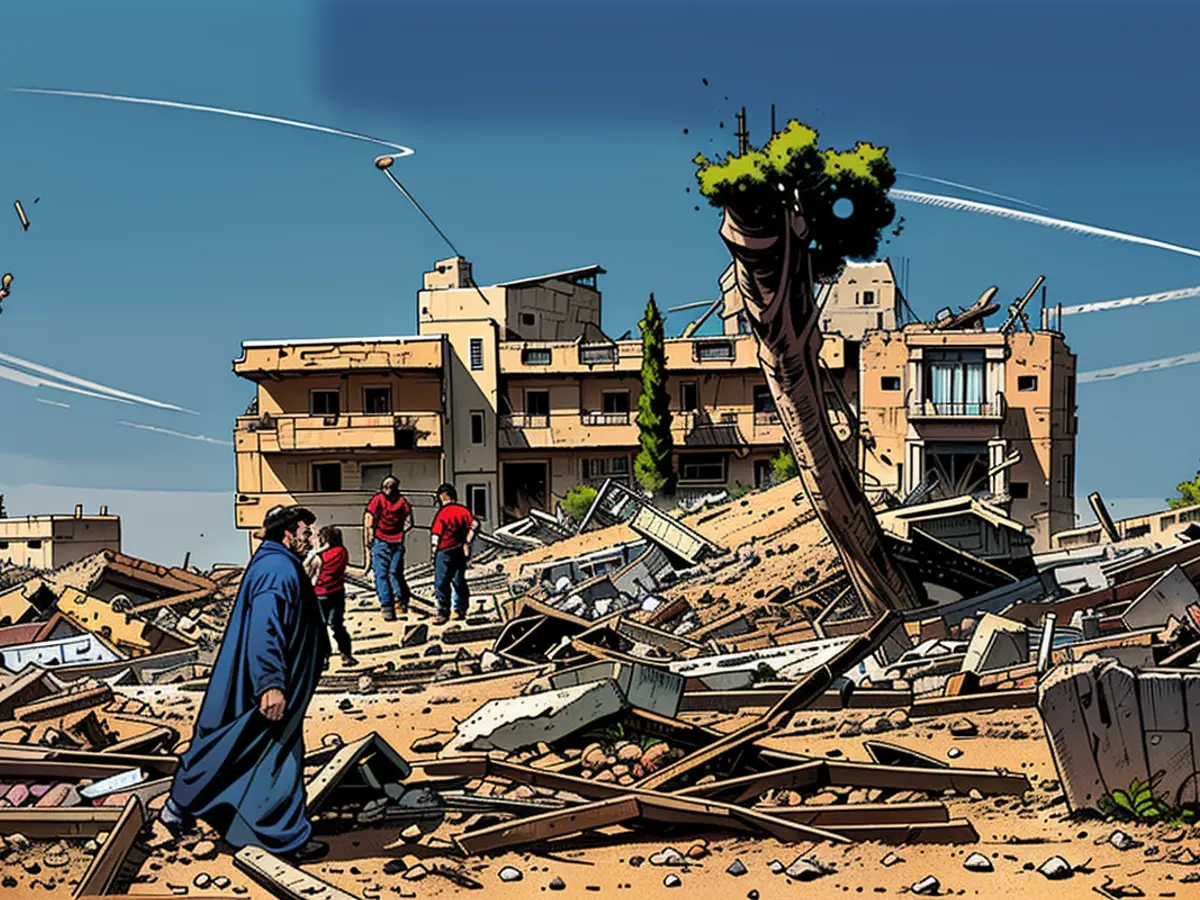"Russia should be held accountable for the occurrence of Black Peter"
In Ukraine, indicators point towards shift. President Zelenskyy announces a "triumph strategy," German Chancellor Scholz advocates for a peace summit. Discussants on ZDF's "Maybrit Illner" debate the likelihood of an end to the conflict in Ukraine.
Next week, Ukrainian President Volodymyr Zelenskyy intends to meet with American President Joe Biden and reveal his "triumph strategy." He might propose that Ukraine be allowed to employ Western long-range missiles even against Russia. However, Scholz has already rejected this suggestion, while the US ponders over it. Zelenskyy has been criticizing the West's actions for months: "I only hear, we're working on it. Russian and Iranian missiles are active as well, but unfortunately, they are employed against us. And Russian President Putin doesn't need permission for his long-range missiles."
Concurrently, half of Ukraine's energy infrastructure lies in ruins, and winter is fast approaching. In Donbass, the Russian military is progressing slowly but incurring substantial losses. Russia's precision-guided bombs bring death and devastation. With these circumstances, the Ukrainian president seems to be preparing for future peace through intensified military actions. The feasibility of this strategy is a topic guests on Maybrit Illner's ZDF show will explore.
One of the guests is diplomat Wolfgang Ischinger, who recently met with the Ukrainian president. Ischinger asserts, "I believe there are two things at stake here. First, Ukraine aims to maintain political control to influence future developments. The second point is strictly military: Zelenskyy will request Biden to lift range limitations." Zelenskyy believes that his trip to the US will propel Ukraine forward. "Expectations are high," says the long-standing diplomat.
Gysi: Ceasefire as leverage
"Ukraine has the right to self-defense," remarks Left Party foreign policy expert Gregor Gysi. "If you're attacked, you can defend yourself against the attacking country. This is straightforward under international law. Whether it's militarily advisable is another matter." In principle, Gysi is clear: After the atrocities committed by the German Wehrmacht during World War II, Germany must not supply weapons to conflict zones. Neither Russia nor Ukraine can win the war militarily, military experts also contend. Gysi suggests, "If that's true, why can't we seriously discuss a ceasefire and peace negotiations?" Gysi proposes: The West should propose a ceasefire to Putin and, in return, abstain from supplying weapons to Ukraine. "If he then rejects it, he would implicitly say, continue delivering weapons. We've never attempted to exert pressure on him regarding this, and I fail to understand that."
Gysi is incorrect on this point. Hungary's President Viktor Orbán attempted to initiate peace talks in July of this year. Despite the controversy and fierce criticism from the EU Commission, the outcome is clear: As soon as the talks concluded and Orbán departed from Russia, Putin bombed a children's hospital in Kyiv.
A tranquil Ukraine is the aspiration of all guests at this evening's Illner show. However, solutions to the question of "how" vary significantly. For Zelenskyy's "peace strategy," there's one main rationale: After 1,000 days of war and destruction, Zelenskyy must also take offensive actions towards his people, says, for example, Marie-Agnes Strack-Zimmermann, now chairwoman of the defense committee in the European Parliament. She can also imagine that Zelenskyy might put Putin in a quandary with the aid of the USA: Cease air attacks on Ukraine, or the Ukrainian army will target military targets in Russia. "Putin would then have to explain this to his own population, who believe a war is happening somewhere that does not truly impact Russia." However, this could backfire, fears Gysi. The shelling of Russian targets could further incite hate towards Ukraine and the West within Russia.
Security expert Frank Sauer from the University of the German Armed Forces believes the time for peace negotiations is not yet ripe. "I believe that both conflict parties anticipate more benefits from continued fighting than from negotiations at present. This is a harsh reality. And a dark reality is also that the manner of negotiations then conducted is prepared on the battlefield."
In fact, there is no indication of peace negotiations on the Ukrainian side if we believe the advisor to President Zelenskyy, who briefly appears on the show. For the interview, which is unfortunately poorly translated, Mychajlo Podoljak has retreated to a bunker. If we believe the translator, he warns against a ceasefire. It might be utilized by Russia for military modernization and exploited politically to later expand the war.
"We must finally put an end to our passive and reactive policy of the past two and a half years," demands Sauer. He also thinks it's right to approach Putin. "We must finally inform Mr. Putin, we will lift these restrictions we're discussing today if you cease terrorizing the Ukrainian civilian population with your rockets day in and day out. We must put him under pressure." The error of Europe, he says, is failing to possess a long-term perspective for the problem: "This is not a regional conflict that has no bearing on us. This is a fundamental problem for the security of Europe. And we have a complete vacuum when it comes to the question of how we should behave. And constantly reacting whenever Putin makes the next threat is not sustainable in the long term."
Sauer's gripes are basically validated by Strack-Zimmermann not long after. Her plan: Persist in arming them, even with Taurus missiles. Yet, this hasn't resulted in peace talks in the past two and a half years, as Gysi mentions. Correct, Strack-Zimmermann concurs, neither has her approach. The truth is, diplomatic discussions are ongoing - for instance, on prisoner swaps or grain deliveries.
The overall vibe from the Illner show that evening seems like old news, but that's misleading. What's actually fresh is the consensus among guests that interaction with the Russian administration is necessary. And: Strong language is needed. Ischinger sums it up perfectly: "We need to place a harsh spotlight on the Russians."
During the discussion on ZDF's "Maybrit Illner" show, diplomat Wolfgang Ischinger suggests that President Zelenskyy may request President Biden to lift range limitations for Ukraine's missiles during their upcoming meeting. Referring to the Munich Security Conference, Gysi proposes, "If that's true, why can't we seriously discuss a ceasefire at the Munich Security Conference and peace negotiations with Putin?"





